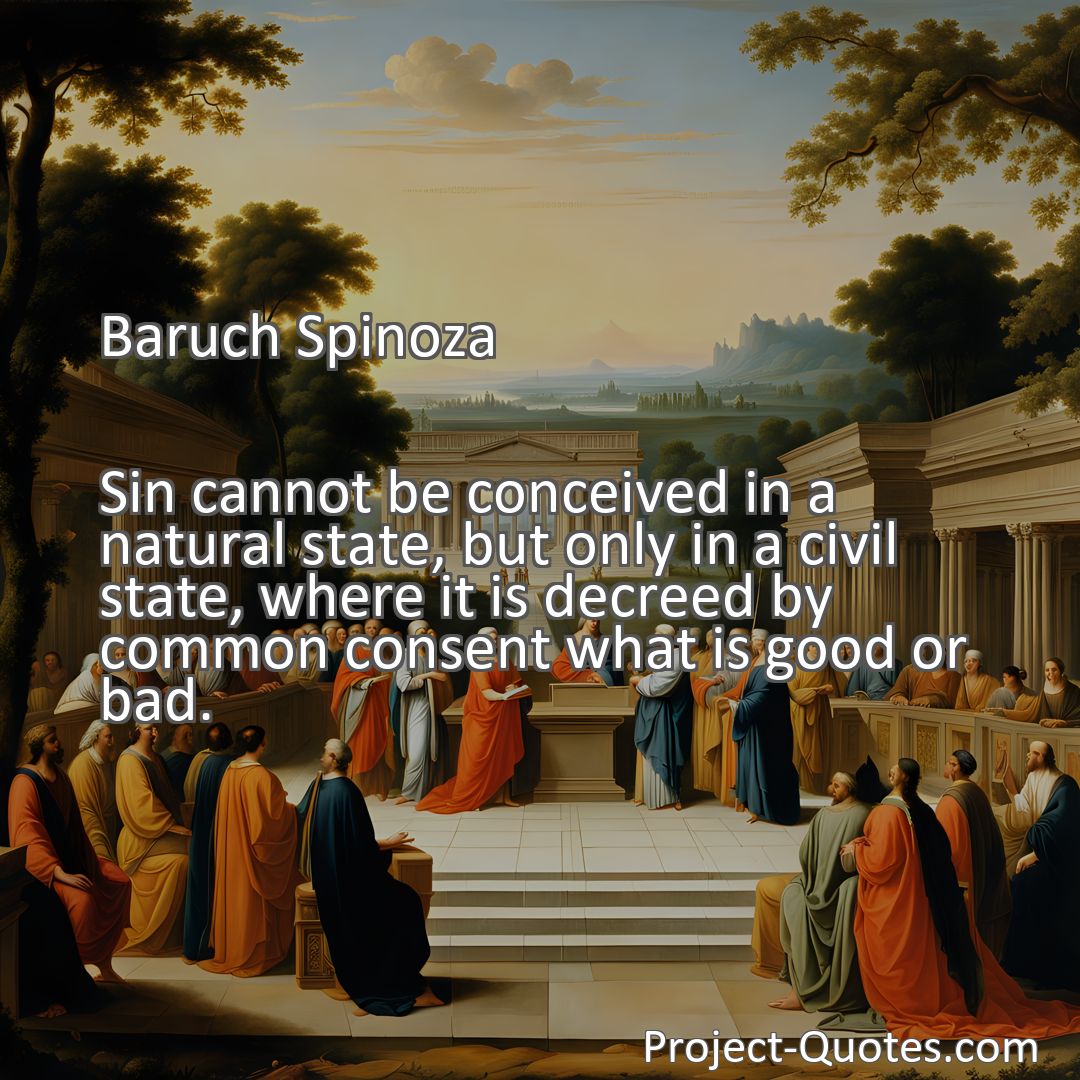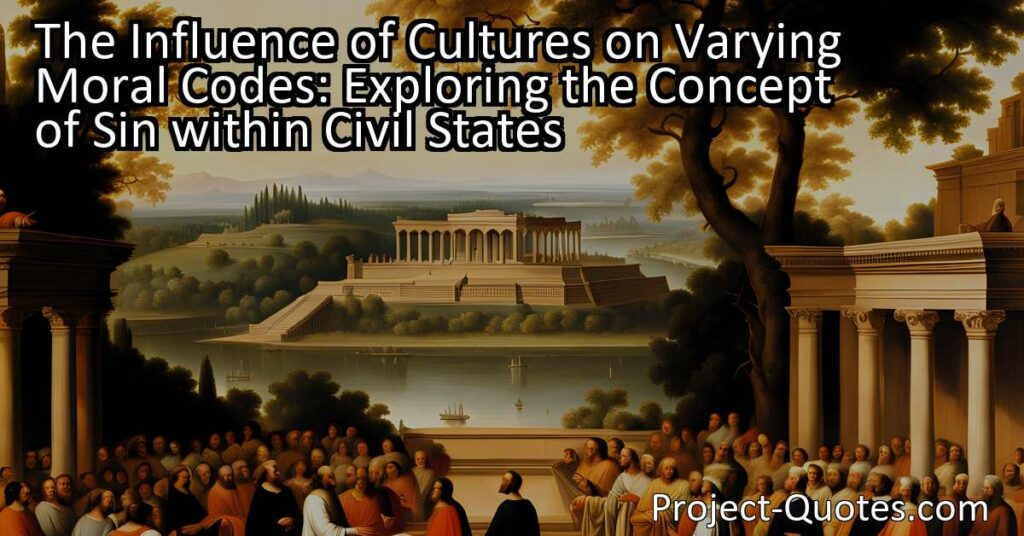Sin cannot be conceived in a natural state, but only in a civil state, where it is decreed by common consent what is good or bad.
Baruch Spinoza
The Influence of Cultures on Varying Moral Codes: Exploring the Concept of Sin within Civil StatesDiscover how different cultures have their own moral codes and beliefs about sin. Each society determines what actions are considered good or bad based on their shared values, religion, and history. However, the idea of sin can be subjective and varies across different cultures, raising questions about its universality.
Table of Contents
- 1 Sin cannot be conceived in a natural state, but only in a civil state, where it is decreed by common consent what is good or bad.
- 2 Baruch Spinoza
- 3 Meaning of Quote – Sin cannot be conceived in a natural state, but only in a civil state, where it is decreed by common consent what is good or bad.
- 4 Freely Shareable Quote Image
- 5 Related
Meaning of Quote – Sin cannot be conceived in a natural state, but only in a civil state, where it is decreed by common consent what is good or bad.
In the realm of morality and ethics, there exists a concept known as sin. It is a term that carries significant weight and implications, often associated with wrongdoing and transgressions against established societal norms. Sin, however, is not an inherent characteristic of human nature but rather emerges within a civil state, where a collective agreement determines what actions are considered good or bad.
To fully understand the nature of sin, we must first grasp the idea of a “natural state.” In this context, a natural state refers to a primordial state of being, free from external influences and societal constructs. It is a state where individuals act on their basic instincts and desires without considering the consequences or societal judgments. In such a state, there is no concept of sin because there is no common consent or agreement regarding what is morally acceptable or unacceptable.
Contrastingly, when human beings transition from a natural state to a civil state, the dynamics drastically change. A civil state denotes a society governed by a system of laws, regulations, and shared values. In this organized structure, a collective consent emerges, establishing a framework of what is deemed virtuous or sinful. It is within this civil state that the concept of sin takes root and flourishes.
At its core, sin serves as a moral compass, guiding individuals towards actions that are deemed socially harmful or unethical. The classification of sin is not absolute or universal; rather, it is subjective and varies across different cultures and societies. What may be considered sinful in one civil state can be deemed innocuous or even virtuous in another. Therefore, the notion of sin is contingent upon societal consensus and the values upheld by a particular community.
One can argue that the attainment of common consent is necessary for sin to exist within a civil state. This consensus is crucial because it establishes a shared understanding of right and wrong, preventing chaos and promoting stability within a society. By collectively agreeing upon a set of moral principles, the civil state sets the boundaries within which individuals should operate. Actions that transgress these boundaries are labeled as sinful, as they contradict the agreed-upon moral standards.
The process of establishing what is good or bad within a civil state is complex and multifaceted. It involves various cultural, religious, and historical influences that shape the collective consciousness of a society. Often, these norms and values evolve and change over time, reflecting the shift in societal attitudes and beliefs. For instance, behaviors that were once considered sinful may become more acceptable as societal perceptions and values transform.
Furthermore, the enforcement of moral standards within a civil state is typically upheld through various social institutions, such as religion, education, and legal systems. Religious institutions, in particular, play a pivotal role in shaping the moral fabric of a society. They provide guidelines and teachings based on their respective doctrines, encouraging individuals to avoid sinful actions and adhere to a virtuous path.
Education also plays a vital role in molding the ethical landscape of a civil state. Through the imparting of knowledge, values, and critical thinking skills, educational institutions have the power to shape individual beliefs and behaviors. By teaching students about the consequences of their actions and fostering empathy and compassion, educators can help prevent the occurrence of sin within a society.
Legal systems, too, serve as a mechanism to discourage sinful behavior in a civil state. They establish a framework of rules and regulations that outline the consequences for transgressing societal norms. By implementing punishment for sinful acts, legal systems aim to deter individuals from engaging in such behavior and maintain social order.
It is important to note that the concept of sin is not without its critics. Some argue that the notion of sin is merely a tool utilized by those in positions of power to control and regulate society. They contend that labeling certain actions as sinful is inherently subjective and can be used as a means for marginalizing or oppressing certain groups based on personal or political agendas.
Additionally, debates arise regarding the universality of sin. As different civil states and cultures possess varying moral codes, the idea of sin lacks a definitive definition across societies. What may be considered sinful in one context may be viewed as morally neutral or even virtuous in another.
In conclusion, sin is a concept that emerges within a civil state, where common consent determines what actions are considered good or bad. It is not an innate characteristic of human nature but rather a social construct influenced by various cultural, religious, and historical factors. The establishment of moral standards and the enforcement of these standards through social institutions help shape the notion of sin within a society. However, the subjectivity of sin and its inherent connection to power dynamics raise questions about its universality and its potential for misuse. Ultimately, the understanding and interpretation of sin depend on collective agreement and the values upheld within a particular civil state.
I hope this quote inspired image brings you hope and peace. Share it with someone who needs it today!


